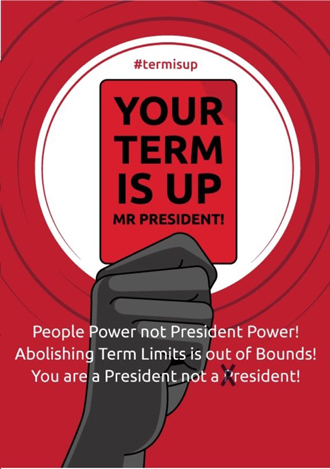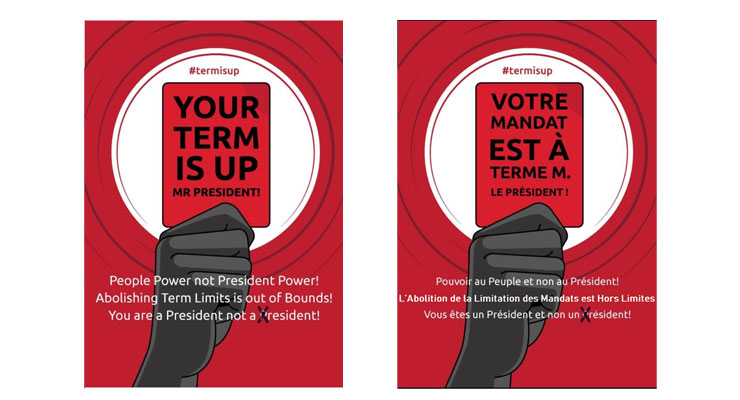Africa celebrates “Africa Day” on the 25th of May every year. Africa Day marks the formation of the Organisation of African Unity (OAU) in Ethiopia, in 1963. The OAU evolved into the African Union (AU) on the 25th of May 2001. The day is about celebrating Africa’s independence, freedom, dignity and the unity of all its citizens. On the occasion of this year’s celebration of Africa Day, it is urgent to include the third-termism issue in the discussions on Africa’s future. Some activists are leading the discussion and have designed a “Red Card” Campaign to draw the attention of the world to this problem Africa is facing.
The red card campaign urges everyone to join efforts to stop the threat to freedom and democracy on the continent that is occurring with the changes to term limits. It is evident that there is an unsettling trend of African presidents who are ignoring their term limits, extending them or abolishing them completely, whilst others delay elections to stay in power.
The red card campaign is about Africans sending a message to its leadership that this practice is “out of bounds”. This trend clearly threatens to roll back the democratic gains made in Africa and to re-entrench one-man rule and authoritarianism. The red card is designed as a tool to raise awareness and provide a citizens check on the potential abuse of power.
What is democracy and what has been Africa’s experience with democracy?
Democracy can be captured as leadership alternation, that is, a regular change in the personnel in charge of the executive regardless of whether the leader is from the same party as his predecessor or not. Based on this definition, the (re)democratisation of the 1990s in Africa after 30 years of One-Party politics has certainly yielded dividends. It came with a number of constitutional guarantees to support Africa’s nascent democracies. Some of the most important instruments adopted to achieve this were multiparty elections and term limits.
Giovanni Carbone wrote an article titled “Leadership Turnovers in Sub-Saharan Africa: From Violence and Coups to Peaceful Elections” for Istituto per gli Studi di Politica Internazionale (Institute for International Politics Studies) in 2013. In this article Carbone notes that the “Leadership Change” dataset shows that leadership changes have increased from 3.3 every year over the thirty years following independence to 5.2 from 1991 to 2010.
Carbone also states that the “Leadership Change” dataset equally shows that from 1990 to 2012 multi-party elections for executive were responsible for 72% of leadership changes, up from 23% between 1960 and 1989, as against peaceful non-electoral transitions and coups whose frequencies have dropped since 1990.
Some of these alterations have occurred through the voting out of an incumbent while others have occurred because of the expiration of an incumbent’s term limits. The common practice is to set the term limits to a maximum of two terms. However, without diminishing these gains, they remain tenuous in the face of the persistence of the same tendencies of long-stay in power that characterised One-Party regimes. “Third-termist” inclinations are responsible for this problem.
Why is third-termism happening in Africa?
Third termism (seeking more terms than constitutionally authorised) in Africa is the result of the nature of politics in African States. The trend seems to suggest, especially for Africa’s longest serving rulers and those who have inherited the continent’s “Presidential Monarchies”, that accepting the condition of a maximum of two terms resulting from the (re)democratisation process, was more of a ploy to keep power and not a real commitment to democratic ideals.
In effect, some incumbents and their regimes have gradually transformed their countries into neo-patrimonial authoritarian or semi-authoritarian electoral democracies. The consolidation of this neo-patrimonial State and of the one-party dominance that goes with it has led to a number of third-termist manoeuvres to stay in power. Some incumbents have used referenda organised under conditions that do not guarantee credible outcomes or constitutional amendments in parliaments under their control to remove term limits.
Elsewhere, the limitation of mandates exists in the Constitution but ambiguities within the law are exploited through manipulation or self-satisfying interpretations to enable the incumbent to stay in power above two terms and for as long as possible. Finally, some incumbents have simply just ignored term limits or have refused to organise elections. Some have failed to obtain third term bids and some others have succeeded. Nonetheless, we have seen an acceleration of this behaviour in recent years.
The trends
- Pierre Nkurunziza of Burundi has made headlines on the term termism issue, perhaps because of the conflict that his drive for third term has caused. In 2015 he argued that the Arusha Accords did not include the first mandate, since Parliament, not the population, voted him. He succeeded to run for elections in 2015 for a third term and a constitutional referendum for 17 May 2018 saw a yes vote to a new Constitution he proposed winning more than 70%. This new Constitution gives Nkurunziza the possibility of staying in power till 2034.
- Togo, December 2002, Gabon, July 2003, Cameroon, April 2008, Djibouti, April 2010, have repealed term limits.
- The Constitutional amendments in electoral-violence-prone Gabon in January 2018 do not re-instate term limits.
- In Togo, President, Faure Gnassingbé Eyadema, is currently under pressure from the opposition and the population not only for a return to term limits but for the term limits to be applied to him retroactively.
- Congo-Brazzaville (October 2015) adopted through referendum a Constitution that limits presidential mandates to three terms.
- Seychelles is the only other country that also has three terms since 1993.
- In sharp contrast, Comoros has one five-year term but a referendum scheduled for 30 July 2018 could increase it to two terms.
- Rwanda (December 2015) had it modified without deleting it, and set counters to zero, making it possible for Paul Kagame, to stay in power till 2034.
- Lansana Conte of Guinea, Zine el-Abidine Ben Ali of Tunisia, Mamadou Tandja of Niger, Yoweri Museveni of Uganda, Idriss Deby of Chad and Abdelaziz Bouteflika of Algeria had abolished the provision before their successors (Niger) or themselves (Algeria, Uganda, Chad) restored it.
- Worth noting is that even though the Ugandan parliament has re-inserted the term limits in a 2017 parliamentary amendment of the Constitution after it repealed it in 2005, it has also uplifted the 75-year age limit on Presidential candidates in order to enable Museveni, 74, to run for elections for another six years in power in 2021. The Ugandan parliament is dominated by Museveni’s National Resistance Movement (NRM).
- Eritrea’s 1997 Constitution has term limits but the country has never held an election since 1992.
- Ethiopia, Gambia, Equatorial Guinea, Lesotho, Libya, Morocco, Mauritius, SADR, Somalia, South Sudan and Swaziland have never had this provision in their Constitution.Gambia wants to re-establish it while Sudan plans to abolish it.
- Incumbent Edgar Lungu of Zambia’s attempt to argue for a third term arguing that his first mandate did not count as such because he took over from the late Michael Sata has been met with stiff resistance too. His predecessor, Frederick Chiluba faced the same resistance in 2001.
What this upsurge in third termism represents is a tendency at thwarting the democratic process in Africa. It is therefore a threat to the democratic gains of the 1990s and it has had a damming effect on the sense of demo-optimism that arose from the (re)democratisation process. Western powers whose economic conditionality led their Cold War spheres of influence that were African States to (re)democratise in the 1990s have only focused on promoting the adoption and organisation of elections.
They appear uninterested in exerting pressure to dismantle tendencies of creating “Presidential Monarchies” in Africa that have led to severe political violence. In effect, third termist manoeuvres have been the source of violence as they have led to protests (Cameroon, 2008, Senegal, 2012, Zimbabwe, 2013, Burkina Faso, 2014, Congo-Brazzaville, 2015, Burundi, 2015, Togo, 2017) that have been met by repression from the third-termist who employ these means in order to scare the population and force it to submission. This is very horrifying as third-termism is an act of subversion of democracy and to further use violence to promote it constitutes nothing short of a crime against humanity.
In a rare case, a coup returned the country to constitutional order. This happened in Niger in 2010 while in Burkina Faso in 2014 the army assisted the population to pressure long-time ruler President Blaise Compaore to resign from office.
Whatever the case, the consequence of violence surrounding third term bids have been financial and material damage but above all the loss of human life. The African Union (AU) has adopted resolutions not to recognise leaders who come to power by coup (even though it has made several exceptions) but is still to take a firm stance against third termism that is no less an act of subversion. Article 23 (5) of the African Charter on Democracy, Elections and Governance does not expressly mention third-termism as an “…amendment or revision of the constitution or legal instruments, which is an infringement on the principles of democratic change of government.”
There is a need to quickly address this issue if not China’s March 2018 repeal of term limits and Putin’s recent re-election for a fourth term might accelerate the problem in Africa seen that the influence of these major world powers often serves as a substitute when African leaders want to dissuade Western countries from taking any tough measures against them.
 What to do for Africa Day 25 May 2018
What to do for Africa Day 25 May 2018
Hold up the red card on Africa Day as a reminder that African leaders must respect our collective freedom and never forget their role is to serve us, the public, and not themselves.
Share the Red Card widely on social media. Change your social media profile pictures to the red card. Have discussions about leadership, term limits and the African future you want to see on #TermisUp
What the AU must do moving on
The amount of lives lost because of third-termist drives is appalling. Africans cannot keep losing their lives so that a few can enjoy power. Africa’s development cannot continue to be held hostage by these few. The African Union must take appropriate steps to put an end to this problem. It should start by amending Article 23 (5) of its Charter on Democracy, Elections and Governance to clearly mention third-termism as being out of bounds and punishable by sanctions and by military action.

Leave a Reply